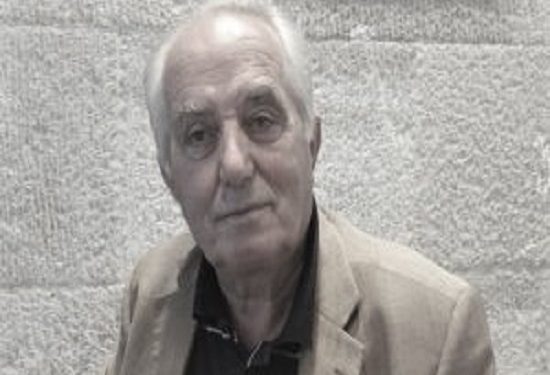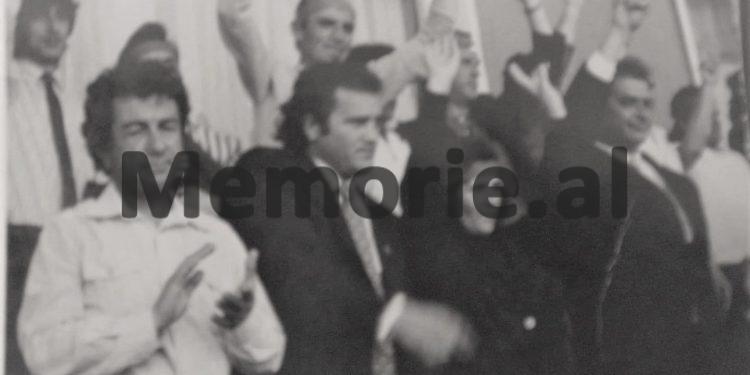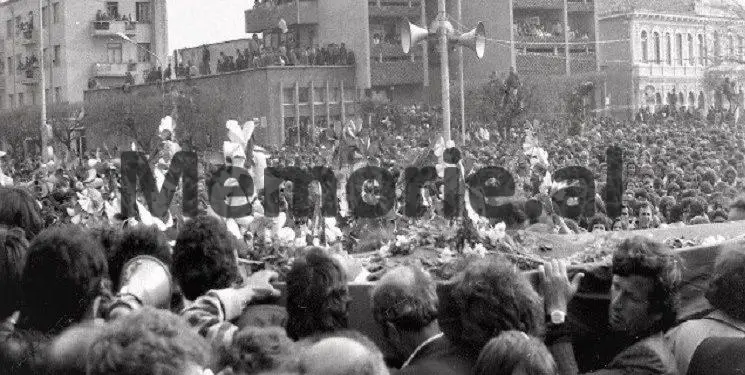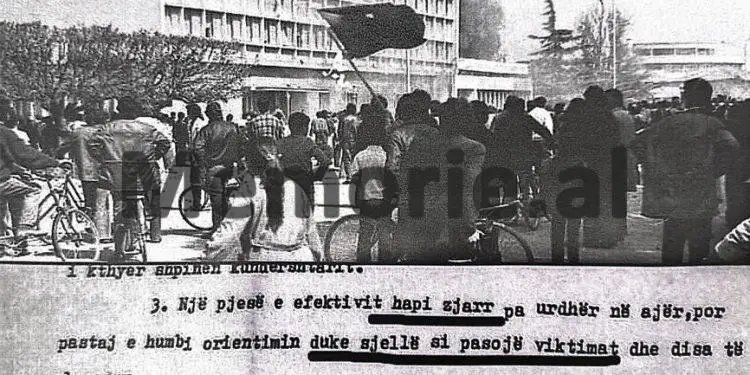By Tanush MULLETI
Part four
Reflections: “How I saw it, heard it and touched it on April 2, 1991, and how I hear it today”!
Memorie.al / April 2, 1991, has entered the history of Albania and is accepted even today by all wings of politics, as a monstrous and macabre crime, where 4 young boys were killed and over 97 people were injured, some of who remained disabled all their lives, all young men and women (as Umberto Eço says: “The truth and only the truth will save us”). The reason for writing these reflections is that we are hearing and reading, intentionally or unintentionally, the history of the event of April 2, 1991. For these notes, I was not driven by hatred, nor revenge, nor ambition, nor interest, but only conscience to tell the truth, publicly, as it happened.
Continues from last issue
The testimonies of Gjek Çelaj, the former chief of the Shkodra Police
…I was 31 years old and I had never seen my mother cry. He had been for me all his life an example of kindness, of strong character and justice. When I graduated from the Academy of Order, in 1983 and went to start my career as a police officer in Puka, he gave me only one order: “Be careful, son, – he told me, – you have a delicate task, that’s why I’m entrusting you don’t hurt anyone, especially don’t hit someone on the neck”… (pages 105-106 Gj. Çela)
…Our entry into the hall was met with a lot of noise and individual shouts, which were accompanied by all kinds of insults addressed to the defendants and, especially, to Ç. Tacit. They were very angry with him, not only as the former head of the State Security for the district for three years, but also because of the fact that, during that time, there had been the killing of several people trying to cross the border illegally and two of the bodies killed at the border, they had gone for a drive. This low act, committed a year ago, had created outrage”…
…On April 2, 1993, while the president of the Albanian state, Sali Berisha, was traveling with an escort to Shkodra…, I was traveling to Lezha, to attend the funeral of my 56-year-old father. He was the only one of my people who continued to have absolute faith that the Supreme Court (Cassation) would overturn the first two decisions and release me from prison.
Located in the city of Shengjin, together with my younger brother, he suffered a myocardial infarction, as soon as an innocent man announced the news of Radio Tirana on the street, about the upholding of my sentence, with 15 years of imprisonment.
After two days, that is on April 2, I took part in his funeral, thanks to the courage and honesty of the director of the 313th Prison, Mr. Tanush Mileti, who took over my sending, contrary to the opinion of the leaders of the Ministry of Order, from which the institution of Re-education depended, to whom they had said: “How a girl turns out, how a boy turns out, you will keep it. We don’t tell you to let him go to the funeral” … (page 275 Gj. Çela)
About this event, this is how A. Shyti writes (page 275):
“It is to the credit of Tanush Milet, the director of the prison, that Gjeka escorted his father to his last apartment. After Gjeka left for Lezhë, Tanushi met me and told me that the leaders in the Directorate of Prisons (my note, T.M.: not the prisons but the Minister and above), had been reluctant to give permission.
After his insistence, they had told him to make the decision himself. I met Tanushi at the meeting with the leaders of the Independent Trade Union in Shkodër. He was one of the leaders of the Syndicate. Tanushi was manly and I completely believed what he told me. He was aware that he was taking a risk for himself.
After 30 years, the truth must be told. The merit of my insistence was the request for the implementation of European regulations and legislation on Human Rights, based on the fact that the European Convention on Human Rights prevails over Albanian legislation. At that time, President Berisha was committed to respecting the Conventions before the EU and the US State Department.
But I think that the main thing is that I was lucky to work with a minister like Bashkim Kopliku, very prepared and cultured, not corrupt, who did not need a translator. If I were to call it a clash, I had a problem with the advisors of the state leaders, such as: lawyers, prosecutors, soldiers, etc., who came from the indoctrinated schools of communism. We must remember that historically, prisoners during the War, during Zog’s time, and during Turkey’s time, have participated in these ceremonies for joys and sorrows.
Gjek Çela was not accompanied by an escort. He respected the permission. Gjeka changed the mentality of the senior staff and caused the reform to move faster and without obstacles. For this and others, we received thanks from Strasbourg and was quoted in Albania’s Progress Report. With the departure of Minister Bashkim Kopliku, the reform began to be restrained.
The misfortune of Gjek Çela was that it happened to him at the wrong time and in the wrong place, in that very difficult task for the time, when the communist system was rotten and could no longer be maintained. It was only a matter of time, the overthrow of that regime. According to the information I had, Gjeka was a model student at the school of the Ministry of Internal Affairs. He took a profession imposed by the government, which he did not want. He showed character and was manly.
Aredin Shyti, had a long career in the Police, starting from the bottom, up to the highest level of management. In his book (page 184), Aredin Shyti writes that, when he was appointed deputy of Gramoz Ruçi, some of his friends and collaborators, such as Neshat Tozaj, Estref Myftari and Miltiadh Muçi, had advised him to resign, handed over the keys and distanced himself from the traditional politics of the ALP.
Among other things, Neshati had told him: “The ability, the courage, the police skills, should not be used by the current leadership of the APS. The one you have in charge is no different from those who have been”.
Even after 30 years of democracy, we continue to say that; The fault lies with the State Security, as the “hand, ear, eye of the Party” and “sword”. We forget that Sigurimi worked with a platform approved by the Political Bureau of the ALP.
For this, ISKPK with the publication “The Secret Platforms of the Operative Work of the Ministry of Internal Affairs”, prepared by Kastriot Dervishi, (year of publication 2022, from pages 133-155, chapter VII), in the section where the “Platform of the Operative Work of of 1985”, dated February 12, where they discussed Enver Hoxha, Hekuran Isaj, Simon Stefani, Foto Çami, Pëllumb Kapo, Ramiz Alia, Pali Miska, Rita Marko, etc., who unanimously approved the “top secret” Platform, where it is expressly written:
“All the orders, instructions and regulations that regulate specific aspects of the operational work process are based on and for the implementation of this platform. The first secretary of the Central Committee of the Labor Party of Albania, Enver Hoxha”. (AQSH/AP, P. 14 or, V.1985, D.9/1, pages 44-76)
Following the breakdown of the Platform, the following were published: “Measures to be taken against elements of high risk”, (with No. 90, dated 17.04.1987, Exemplar 27, secret of special importance, 12 pages), where it is spoken among others for Lists No. 1 of No. 2, which today are called “Death Lists”.
This clearly proves that the Political Bureau was a criminal, structured, terrorist group; illegal party, unregistered according to the Constitution. (Memorial 1, year 2021, ISKK publication, Dr. Çelo Hoxha, Prof. As. Afrim Krasniqi). J. P. Sartre is right when he says: “we are our works”. These were the “works of the Party”.
For 45 years, communism with the slogan: “Party above all”, the Political Bureau, illegally, contrary to the Constitution, has ordered the executive power. During the 30 years post-communism, if yesterday the party ordered the police, today the power orders the “State Police”, which means that, every time the government changes, we have to change the entire dome and the leaders of the police.
April 2, was repeated after 20 years, on January 21, 2011, in archaic form, where four demonstrators were killed on the boulevard. April 2 was made by high school students and the people of Shkodra, while January 20 was made by the opposition party.
Peace, Democracy and Freedom cannot coexist without the rule of law. With the slogans: “everyone wins with us”, “the greatest good, for the greatest number” and “take what you can”, we will never build a state of law and endanger freedom and peace.
The protagonists of the events of January 14, 1991, December 13, 1991, and April 2, 1992, must remain in the historical memory not only for the people of Shkodra, but for all of Albania. In Shkodër, the busts of Stalin, Enver, and Lenin were removed for the first time, along with communism. Honor and Glory to these heroes! Memorie.al














